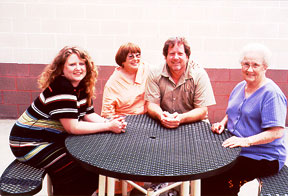 |
My entire family has tested positive
By Bev Draper

My brother, Larry Cullum, is confined in a
Beaumont, Texas low security federal prison. He was transferred
from Florence, Colorado to Beaumont about a year ago. Before
Florence, he was held at USP Terre Haute in Indiana. The reason
why he was sent to Terre Haute and to Florence, both high security
prisons, was the length of sentence he was given, not because
he was violent in any way. In the 11 years he served in the FCI
system (the medium level of custody), he earned enough good points
to be downgraded to the lowest security rating possible with
his sentence, and was sent to Beaumont at his request last year.
When Larry was in Florence, our 75-year-old mom was denied access
the second day of our visit because she did not pass the drug
screen test. We were able to visit Larry for an hour on Friday
evening when we got to Florence from Dallas. I spent over $1,000
on tickets, hotels and rental car, and she was denied access
for the remainder of our time in Colorado. We were upset, but
did nothing about it, even though we are innocent of any crime.
In October 2000 my mom and my niece visited my brother, and neither
passed the drug screen test the first time, but did pass the
second time. When the guard was asked how can the machine test
positive the first time and negative the second time, they were
told, "The machine must have sucked the drug off."
This is a crock.
Even though we have never taken any illegal drugs, or have been
around people using illegal drugs, my mom, niece and I have now
tested positive at least once for some kind of drug. Never at
the same time, although we have always been together while visiting
my brother at different prisons. On many occasions, from what
I've seen, people test positive and then negative within less
than two or three minutes. On other occasions, they test positive
twice within the same extremely short time span and then are
denied access for 48 hours, which means they have spent money
and time in vain and are denied their visits.
On Mother's Day 2001 my 77-year-old mom, my niece and I flew
to Beaumont to see my brother because he had been unable to spend
Mother's Day with our mom for the past 11 years. We visited him
on Saturday, but on Sunday morning I did not pass the drug screen
test. I did something else for Mother's Day. While my mother
and niece visited at the prison, I traveled to Port Arthur to
have a drug test taken at a hospital, to prove I had taken no
illegal drugs.
In Florence, when my mother tested positive, the only thing my
mom did differently from what I did, was pay for our breakfast
with cash. The previous day we went directly to the FCI from
the plane/hotel, and neither of us handled any cash. The day
before Mother's Day, I paid for our breakfast by credit card
and we all passed. On Mother's day, I paid cash for breakfast.
Could handling cash be enough to activate the "residue"
machine? Both of us got the cash for the trip either through
normal retail transactions or, most likely for me, from the bank
before I left on each trip.
Apparently these drug testing machines are not calibrated accurately
if they can have both a positive and a negative result on the
same person within two or three minutes of each sample test.
Or, they may be calibrated so sensitively as to detect any unintentional
contact with any controlled substance, no matter how small. In
either case this is improper denial of our rights to due process
as U.S. citizens.
What troubles me now is that we are registered with the Bureau
of Prisons as having been denied access for testing positive
for a controlled substance. When I asked what drug my test revealed,
they told me I tested positive for LSD. Believe me when I say,
I wouldn't know it if I saw it.
I have never condoned the fact that my brother broke the law,
but I have always and will always love him. While these two incidents
were hurtful and inconveniencing, the end result did not pose
a severe financial impact for me. But this is likely not the
case for many other families with no or low incomes. Money spent
trying to visit could hinge on whether they eat well that month
or just get by.
What is most personally troubling is that, even though we are
innocent of any crime, we feel deterred from planning future
visits. Prison officials have taught us to never be sure you
will be able to visit once you get there. Usually the prisons
are located in areas where there is little to do other than go
to the prison.
Frequently published stories based on legal documents show that
guards and prison vendors are often the main conduit for drug
trafficking into the prisons, yet it is family visitors who are
targeted by so-called drug detecting machines. I can only conclude
that the ultimate goal of this type of testing is not to deter
drugs from entering the prison - but to deter family and friends
from attempting to visit their imprisoned loved ones.

|

